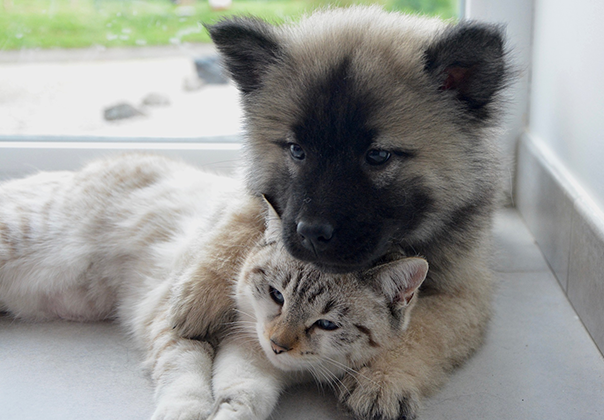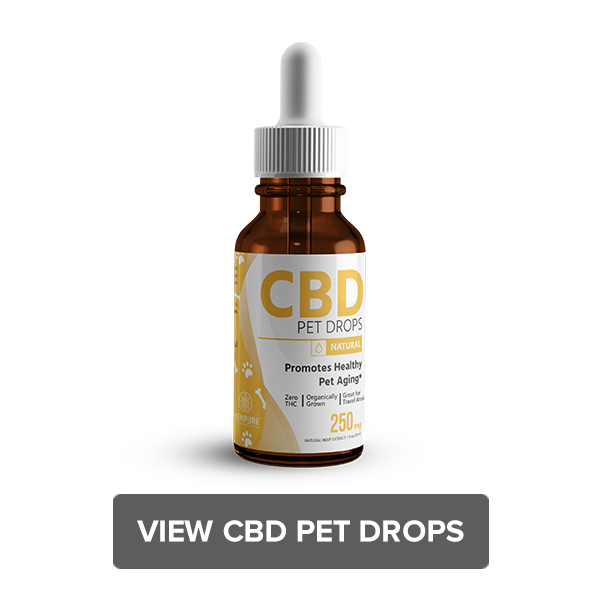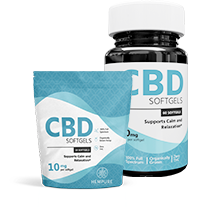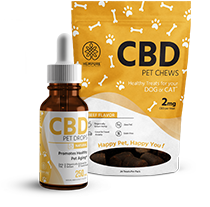The Science of CBD For Dogs and Cats
Sabina King on Jun 21st 2019
There’s no shortage of pet products available for owners that want their pets to experience optimal health and wellness. The days of dried kibbles passed by and with them came the advent of exciting new foods and treats and products. One of the most promising and exciting pet products right now is CBD drops for pets. With more pet owners praising CBD for its wealth of benefits, new questions have arisen regarding the science of CBD For Dogs and Cats.
The science of CBD for dogs and cats and why it is beneficial for them is similar to the science behind CBD and its interactions with humans. We examined many of the studies that have been published surrounding CBD and cats and dogs and consulted the writings of some prominent veterinarians encouraging CBD’s adoption in the veterinary community.
Cannabinoids For Pets: Early Research
"At this point, there have not been many studies that have looked at the effects of cannabinoids in dogs and cats. While this may be the case, that does not mean that veterinarians and pet owners should avoid giving dogs and cats CBD."
As Dr. Gary Richter stated in his book The Ultimate Pet Health Guide: Breakthrough Nutrition and Integrative Care For Dogs and Cats.
In veterinary medicine, we commonly use “human” drugs that are not specifically approved for use in animals. Thus, there is limited research into the science of CBD for dogs and cats. This is because it is not financially worthwhile for a pharmaceutical company to spend millions of dollars to get a drug specifically approved for dogs and cats. This standard of practice is known as extra-label usage.1
There have been enormous numbers of studies examining the potential of CBD in humans and this information should be an acceptable form of information by which pet owners and vets can properly determine how to integrate CBD into their pet’s lifestyles.
Understanding CBD in Dogs and Cats
In humans, dogs, and cats CBD works by impacting the endocannabinoid system. All vertebrates have an endocannabinoid system that plays an integral role in building and optimizing health.
As Kit O’Connell from Ministry of Hemp noted:
"One of the most remarkable things about hemp in all its forms is how the natural compounds in it interact with the body's own 'endocannabinoid system.' This is a system in our bodies that are still relatively under-researched, but our bodies respond in myriad ways to both our own, internally produced cannabis-like chemicals and those found in hemp like CBD. This is equally true for cats and dogs, and indeed all mammals and most other living beings including birds. This means that most of the same benefits of CBD for humans are available for our four-legged friends."
The Function of the ECS
The endocannabinoid system, or ECS for short, exists throughout all 11 major physiological systems of the body and helps each of them to carry out their functions. Many doctors and scientists refer to the ECS as a “meta-system” because of the way it exists within these systems while also governing them. This system aids in almost every single aspect of health.
This system always has one goal in mind: establishing homeostasis. Homeostasis can be thought of like balance. The ECS works to make sure that each system of the body remains balanced.

In humans, dogs, and cats, the ECS contains three main components: endocannabinoids, receptors, and enzymes.
Endocannabinoids act like keys within the system, while receptors act like locks. Every time one of the endocannabinoids fits into a receptor, the receptor causes an effect to occur somewhere in the body. The effect that takes place is dependent on where the receptor is located. CBD is a cannabinoid and works to boost the body’s own endocannabinoids and help them to function properly.
An enzyme is any substance within the body that produces a chemical reaction or helps to accelerate a reaction that is already occurring. Enzymes interact with the ECS after endocannabinoids have been used. They operate like a cleanup crew after an event, making sure that everything is put away properly once the event is over. Enzymes ensure that after endocannabinoids have been used, they are properly put away.
CBD products like CBD dog treats work by blocking enzymes within the ECS which gives the ECS more endocannabinoids to function with. This allows the ECS to function more efficiently and create more balance throughout the body.
The science of CBD for dogs and cats starts with the endocannabinoid system. Because the endocannabinoid system exists throughout the bodies of dogs and cats, CBD holds the potential to produce dramatic and sweeping effects. One study carried out by the Journal of the American Holistic Veterinary Medical Association analyzed the way in which pet owners were using CBD to aid their pets. The study discovered that many pet owners had been recommended CBD by their veterinarians and that there were many different improvements seen in the pets including improved mobility, better sleep, more calmness, and better skin.2
Altering Behavior In Dogs and Cats
While you may love your pet, you may not love their behavior all the time. Pets have a tendency to be great companions one minute and misbehaved delinquents the next.
Many pet owners have discovered CBD can be a useful way of calming down an overly excited or active pet. As Dr. Robert J. Silver suggests:
"The fear of loud noises like thunder can be terrifying to many pets. Even the use of strong sedatives often do not work. I have been hearing from a number of my clients that they have used some cannabis to help reduce their pets’ terrors from hearing those thunderstorms rolling in, and even for July 4th fireworks. Other potential applications include its use in hyper-excitable dogs and cats to allow them to be more pleasant members of your household."3
Cannabinoid receptors play a major role in the regulation of many neurotransmitters associated with mood, stress, and fear including serotonin, norepinephrine, and acetylcholine along with the stress hormones cholecystokinin and opioid peptides.4 Because CBD interacts with and helps to regulate the functioning of these receptors, it shows promise in regulating the mood and behavior of both dogs and cats.
Can My Pets Overdose On CBD?
There have been no reported cases of any pet overdosing on CBD.
The FDA does not regulate CBD. However, studies have shown that dogs can ingest 90mg CBD via IV and 180mg orally without risk of overdose.6 This is substantially more CBD than most CBD products on the market offer. For reference, Hempure pet chews have 2mg CBD per chew, and we recommend half a chew or less for small dogs.
How much CBD should I give my dog?
The amount of CBD you give your dog or cat largely depends on the animal's weight. Giving 0.05mg of CBD per pound of your dog's weight is a good benchmark. For example, if your dog weighs 15 pounds you will give them .75mg of CBD or slightly less than 1/2 a CBD pet chew. You can use the same calculation to figure out how much CBD to give your cat. See our pet calculator for an accurate dosage for your pet. A large part of the science of CBD for dogs and cats relies on an accurate dosage!
Choose CBD designed for Pets
It is important to examine the ingredients of the CBD you are purchasing. If the CBD was not designed for dogs or cats, it is best to refrain from using it. There are ingredients in human CBD that may not be good for dogs or cats like chocolate or coffee.
Important Considerations with Pet CBD
One of the most important things to do is consult your veterinarian about giving your pet CBD. Many veterinarians are beginning to see the benefits of CBD and the potential it has.
In an article on Veterinary Practice News, Veterinarian Patty Khuly stated:
"After recommending it to hundreds of patients (I carry it in-house now), I’ve not yet observed an adverse reaction. Sure, some patients have balked at its delivery, but that’s about it for negatives."8
Robert J. Silver also stated in his book Medical Marijuana and Your Pet
"There are many potential uses for cannabis in pets, but there may also be potential for abuse of cannabis in pets. For this reason, I recommend that you find a veterinarian who is '4/20 Friendly' and ask their advice about the use of cannabis for your pet before you actually give them any."9
Choose CBD Pet Products with Zero THC.
Another aspect impacting the science of CBD for dogs and cats is whether it has THC in it or not. It is also important to verify whether the product you’re using contains any THC. THC is the psychoactive component in cannabis that is responsible for producing a high. Just like humans, this can produce an effect in animals. Animals are much more sensitive to THC than humans and can get sick if given too much.
Kit O’Connell from Ministry of Hemp offered the following advice:
"Of course, caution is needed because cats and dogs are both especially sensitive to THC. Most commonly found in psychoactive cannabis, aka marijuana, extremely small trace amounts of THC can still be found in CBD supplements. It's important to look for a CBD supplement with as close to 0% THC as possible for pets. Ideally, pet owners should find an open-minded vet to work with, who can help them tailor the dosage for their animal's specific needs. This will become easier as the remaining legal issues and stigma around hemp disappear, and scientists continue their research into mammalian endocannabinoid systems."
While THC is illegal at the federal level, it is legal at the state level in some states. Ensure that you are getting a product that does not contain THC unless recommended otherwise by a veterinarian.
Conclusion
The science of CBD for dogs and cats is still emerging, but so far shown tremendous promise. In fact, we already know CBD works within the endocannabinoid system. The result of a healthy ECS can be good health and homeostasis. By boosting the endocannabinoid system, CBD can help to balance out many different aspects of health in cats dogs. More veterinarians are beginning to document the positive benefits found through researching the science of CBD for dogs and cats.
SOURCES:
- Richter M.S. D.V.M., Gary. The Ultimate Pet Health Guide (pp. 91-92). Hay House Inc. Kindle Edition.
- Lori Kogan, Consumers Perceptions Of Hemp Products For Animals, American Holistic Veterinary Medical Association, 2016, https://www.ahvma.org/wp-content/uploads/AHVMA-2016-V42-Hemp-Article.pdf
- Robert J. Silver DVM, MS. Medical Marijuana and Your Pet (Kindle Locations 1044-1048).
- Simone Tarboro, Marco Bortolato, Cannabinoid-related agents in the treatment of disorders: current knowledge and future perspectives, 2012, https://www.ncbi.nlm.nih.gov/pmc/articles/PMC3691841/
- Meriam-Webster Dictionary, https://www.merriam-webster.com/dictionary/LD50
- E Samara, M Bialer, R Mechoulam, Pharmacokinetics of Cannabidiol In Dogs, Drug Metabolism and Disposition, 1988, http://dmd.aspetjournals.org/content/16/3/469.short
- Source 1
- Patty Khuly, What's the Deal With CBD, 2018, https://www.veterinarypracticenews.com/whats-the-deal-with-cbd/
- Robert J. Silver DVM, MS. Medical Marijuana and Your Pet (Kindle Locations 1079-1081).
















